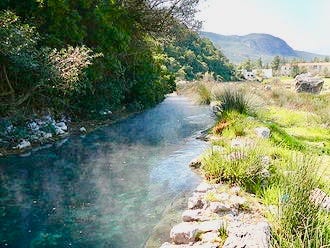A Laconic epitaph
On the dead at Thermopylae
The most famous military engagement of classical Greece, memorialised in the 2006 fantasy film 300, is the Battle of Thermopylae (pronounced in English ther-MOPple-eye) of 480 BC. It took place during the Greco-Persian Wars of 490-479 BC, in which the Greeks eventually fought off the invasion of the Persian forces under the command of the emperor Xerxes.
‘Thermopylae’ meaning ‘hot gates’ was the name of the pass in northern Greece between the sea and the inland mountains, where natural hot springs are still to be found. The Persian forces marching from the north, said to have numbered around quarter of million men, had to go through the pass to get to southern Greece. They were blocked by a force of around 7000 Greeks from different city states. Among these were 300 Spartans under the command of the Spartan king Leonidas.
The Greek forces held the pass for three days against the assaults of the Persian crack troops, the 10,000 ‘Immortals’. But they were betrayed by Ephialtes of Trachis, who showed the Persians a mountain path that would allow them to outflank the Greeks. Leonidas and his men, along with around 1000 other Greeks, decided to stay and fight to the death, while other Greek forces were allowed to retreat so that they could fight another day.
The defenders fought with great heroism, says Herodotus, “fighting to the last, with those who still had swords using them, and others resisting with their hands and teeth.” The Spartan force was annihilated, with the exception of two men who returned to Sparta to tell the tale.
The Spartans were famous for being people of few words: ‘laconic’ means brief, from the Spartans’ name for their land, Laconia. Simonides, the foremost poet of Greece, composed an aptly brief epitaph for the fallen in elegiac metre (a hexameter followed by a pentameter):
Go back and tell the Spartans, passer-by, That here, fulfilling their commands, we lie.
Ὦ ξεῖν', ἀγγέλλειν Λακεδαιμονίοις ὅτι τῇδε κείμεθα, τοῖς κείνων ῥήμασι πειθόμενοι.



As you know, Cicero had a go at translating Simonides:
Dic, hospes, Spartae nos te hic vidisse iacentes
dum sanctis patriae legibus obsequimur.
Go stranger and to Lacedaemon tell
That here, obeying her requests we fell.